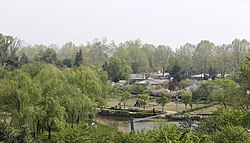You can help expand this article with text translated from the corresponding article in Korean. (January 2015) Click [show] for important translation instructions.
|
Yongsan Family Park (Korean: 용산가족공원) is a park in Yongsan District, Seoul, South Korea. It is also known as Yongsan Park (용산공원).
| Yongsan Family Park | |
|---|---|
 | |
 | |
| Type | Public |
| Location | Yongsan District, Seoul |
| Coordinates | 37°31′22″N 126°59′01″E / 37.52278°N 126.98361°E |
| Area | 75.900 hectares (187.55 acres) |
| Established | November 1992 |
| Open | All hours, every day |
| Parking | Onsite (50 spaces) |
| Website | www |
| Korean name | |
| Hangul | 용산가족공원 |
| Hanja | 龍山家族公園 |
| Revised Romanization | Yongsan Gajok Gongwon |
| McCune–Reischauer | Yongsan Kajok Kongwŏn |
The area of the park is 75,900 square metres (817,000 sq ft).[1] It has a 2 km (1.2 mi) walking path and a variety of facilities, including Taegeukgi Park in the center.[2][3] Pigeons and wild pheasants live in the park.[2] Several ponds and lakes are in the park.[2] It is open throughout the year, at all hours.[2] There is a path in the park where guests are intended to walk it barefoot. It has a texture that is meant to perform acupressure on your feet.[4]
During the Japanese colonial period, the park was used as a Japanese military facility from 1906 to the liberation of Korea in 1945.[4] It was part of the US military base Yongsan Garrison, the headquarters of the US military in South Korea after the Korean war, including the base golf course.[4][1] In December 1988, efforts began to convert the area into a civilian park via a presidential decree.[5] The park opened in November 1992.[1]
It is accessible from Ichon station on line number 2 and Seobinggo station on line number 1.[4]
References
edit- ^ a b c 용산가족공원. parks.seoul.go.kr. Retrieved 2023-09-17.
- ^ a b c d "Yongsan Family Park (용산가족공원)". VisitKorea.or.kr. Retrieved 2023-09-17.
- ^ Si-jin, Kim Hae-yeon;Hwang Joo-young;Lee (2023-08-31). "[Well-curated] Plant hospital, Joseon-era wedding and Yongsan Family Park". The Korea Herald. Retrieved 2023-09-17.
{{cite web}}: CS1 maint: multiple names: authors list (link) - ^ a b c d 용산가족공원. korean.visitseoul.net (in Korean). Retrieved 2023-09-17.
- ^ 서울기록원. 서울기록원 웹사이트 (in Korean). Retrieved 2023-09-17.
External links
edit